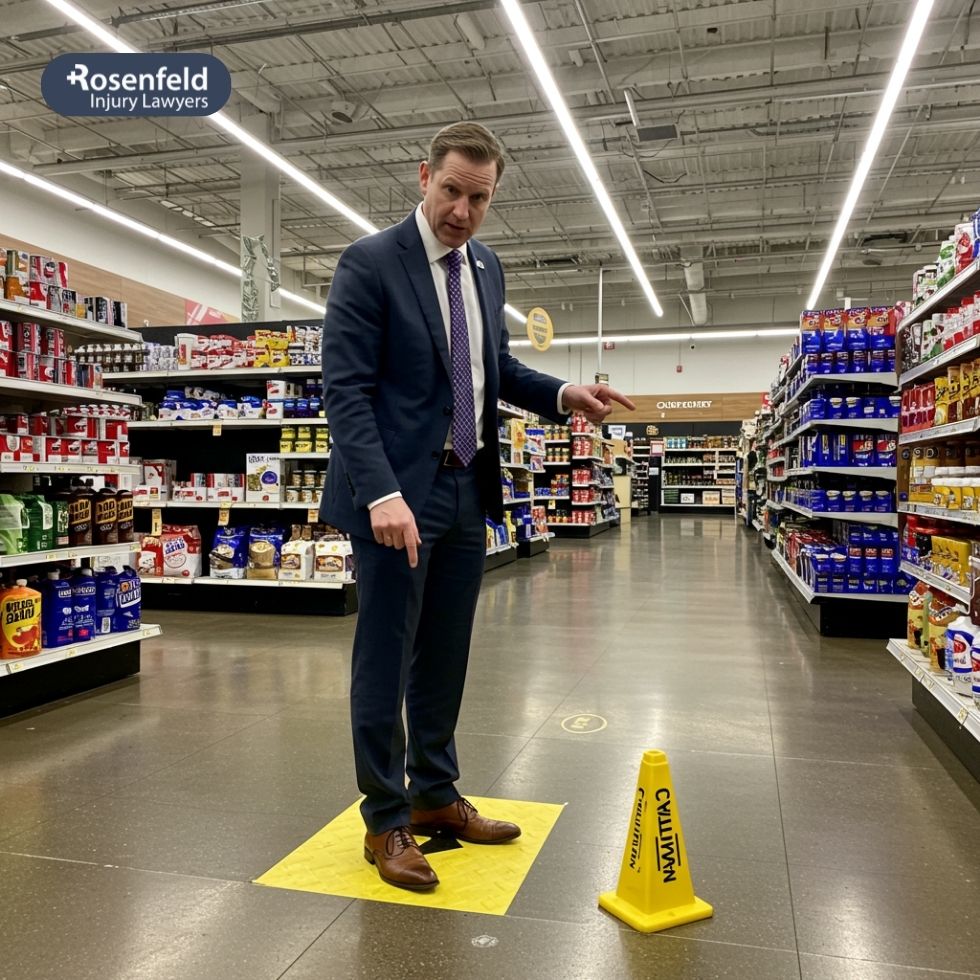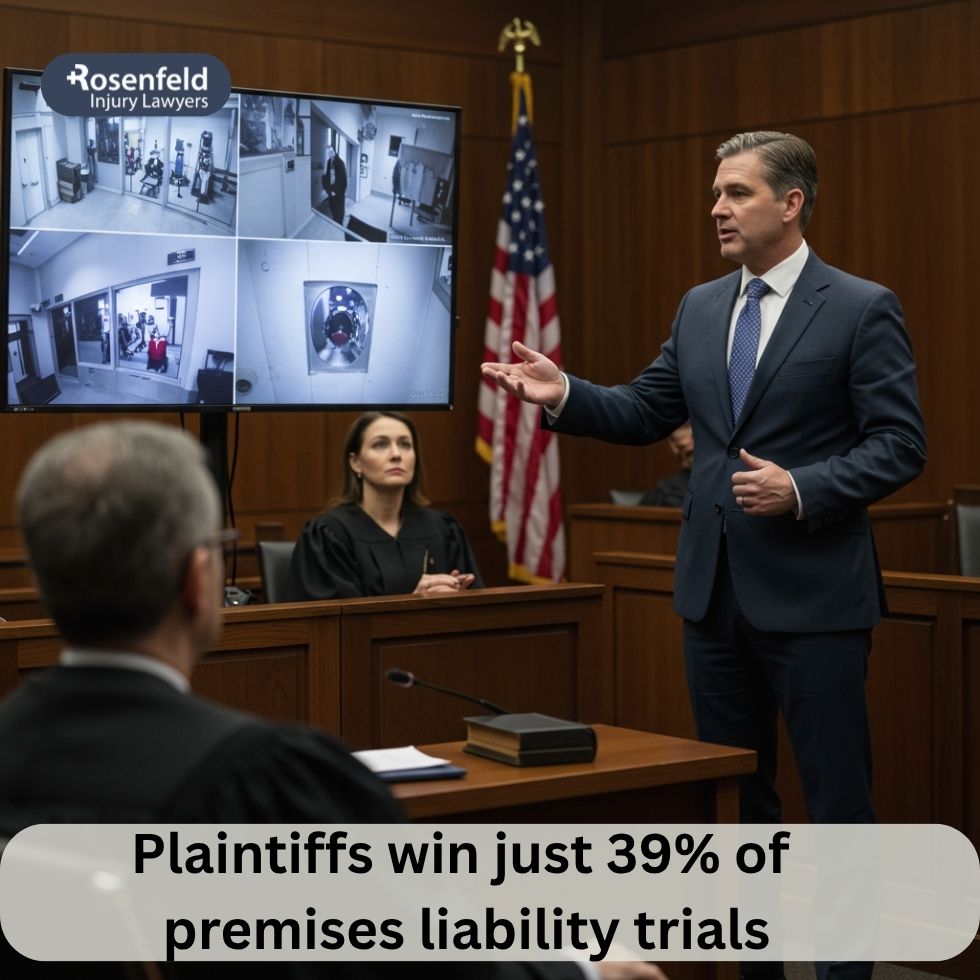Common Defenses in Slip and Fall Cases
Getting hurt on someone else’s property, such as a slip-and-fall accident in front of a Boystown store, typically requires filing a premises liability claim with the insurance company. The property owner and their insurance will likely use these common defenses in slip and fall cases to prevent you from gaining fair compensation.
Our personal injury law offices are highly familiar with how to win a slip and fall case, making us essential allies for your claim. Contact us today for a free consultation about these defenses and your legal rights.

Comparative Negligence
Illinois uses modified comparative negligence in personal injury claims (735 ILCS 5/2-1116). Comparative negligencemeans that everyone involved in the suit is considered partially responsible, and if the injured person is more than 50% responsible, they cannot sue.
Defeating this contributory negligence defense in slip and fall cases requires showing that you took reasonable precautions to prevent injury. At the same time, the property owner failed to act as a reasonable person would, such as cleaning up construction debris.
Open and Obvious Hazard
In a premises liability lawsuit, the defendant may use the open and obvious defense. This defense argues that the typical person would identify the risk and would take care to avoid it, even if not warned by the property owner.
The obvious danger defense was used in the landmark Illinois Supreme Court case Cope v. Doe, which found that the owner of an apartment complex could not be held accountable for a child drowning in a retention pond because an open body of water can always pose a danger to children.
We can counter the open and obvious defenses in slip and fall cases by asserting that it is the property owner’s responsibility to fix issues, even if they are obvious. We can also state that the obvious danger defense does not apply because the risk was not as clear as the property owner claims.
Assumption of Risk
The assumption of risk defense states that the injury victim tacitly assumed the risk of a slip and fall accident by entering the premises. However, the average person does not expect to suffer severe injuries from a fall on another person’s property while performing normal activities, such as walking down the street or leaning on a guardrail. We will use this to argue that your comparative negligence is lower than the other party’s, and therefore, you have the right to recover compensation.
Lack of or Inadequate Notice
Another legal defense is that the responsible party lacked sufficient knowledge of the dangerous condition, either because no one informed them or because it was not readily apparent. Witness testimony, such as that of other guests, can help prove that the property owner was given notice.
If the hazard existed long before the accident, we can use constructive notice. This means that a reasonable person would have noticed the problem, like a termite-infested stairway, even without being told.
Foreseeability and Reasonable Care
The Illinois Premises Liability Act states that property owners must take reasonable care to prevent or fix dangerous conditions on their premises, but that they do not have a responsibility to prevent foreseeable dangers (740 ILCS 130/2).
The reasonable care defense argues that your slip and fall case was foreseeable and that the property owner maintained the premises as any responsible owner would. We can use maintenance records and other evidence to demonstrate that your accident was not foreseeable and would not have occurred if the premises had been in good repair.
Trivial Defects
Even if the property owner knew of problems, they may be able to win a slip-and-fall lawsuit by arguing that the defects were not serious enough to cause an accident. We’ll work with expert witnesses, like engineers, to show that these defects directly contributed to your accident and were not trivial.
We can also use the Chicago Municipal Code to prove the defects were unlawful, such as not having securely fastened railings (13-196-570).
Pre-Existing Conditions
In a personal injury case, your medical records will be scrutinized to determine if another condition, like high blood pressure, could have caused you to slip and fall. This can be disproven through a doctor’s testimony, statements from friends and family, and your medical records.
Procedural Defenses
Defenses in slip-and-fall cases may revolve around the legal process rather than disputing the occurrence of the slip-and-fall incident. Defendants will use Illinois slip-and-fall laws to refute your claim, such as arguing that you have sued the wrong individual or that your claim is time-barred by the statute of limitations.
Suing the Wrong Party
Even if you fall on someone’s property, the property owner is not always the one responsible for the accident. You must demonstrate the defendant’s liability, such as having prior knowledge of the issue but failing to act. Other parties, such as manufacturers or property maintenance companies, may also share a part in the contributory negligence.
Slip and Fall Claims Against Government Entities
The Illinois Tort Immunity Act protects government agencies from lawsuits (745 ILCS 10/). This was seen in Bruns v. City of Centralia, when the city was not held liable for a cracked pavement. In most cases, these cases also have a shorter statute of limitations, typically one year (745 ILCS 10/8-101).
Securing the best legal team available is essential to demonstrating why your case is valid under the Tort Immunity Act, such as reckless disregard on behalf of a government employee.
Statute of Limitations
The statute of limitations for slip-and-fall cases in Illinois is just two years (735 ILCS 5/13-202). If you file after this timeline, your case could be dismissed. Contact our lawyers immediately so that we can begin work on your premises liability claim and meet this deadline.
No Dangerous Condition Was Present on the Property
Similar to the reasonable care defense, the defendant may state that there were no hazardous conditions or that the conditions didn’t violate any statutes. Our attorneys can use the Chicago Municipal Code and Illinois building standards to argue that the property owner violated codes, such as failing to remove ice and snow in front of their Lower Wacker office building (4-4-310 & 10-8-180).
Liability Waiver
This common defense is used if you were hurt while engaging in a sport, class, or activity. For example, you may fall down a flight of stairs after a dance class at the University of Chicago. We must demonstrate that your injury was not directly connected to the activity and that the waiver does not apply to your specific circumstances.
The Plaintiff Failed to Mitigate Damages After the Fall
It is crucial to get medical treatment after a slip-and-fall accident, as this will counter another tactic by defense attorneys. They may claim that the injury victim did not seek medical attention and, therefore, did not attempt to mitigate their damages. Our legal team will use medical records, police reports, and communications to show that you did seek help after the fall injury.
The Importance of Evidence
Evidence is essential to recovering a settlement from the insurance company. Our attorneys will carefully gather documents to show liability, document your damages, and verify the facts of the slip and fall case. Some evidence we can use includes:
- Medical reports
- Lost wages, proven by pay stubs
- Medical bills and out-of-pocket expenses
- Photos of the accident scene
- Photos of the property before and after the accident
- Expert witnesses, like doctors and building inspectors
- Testimony from friends, family, and doctors
- Maintenance records and property inspections

The Importance of Hiring a Slip and Fall Accident Attorney
Legal representation can make a significant difference in whether you secure compensation after a slip-and-fall accident. You should hire a slip-and-fall attorney who is familiar with the local statutes and has the resources to gather thorough evidence. Additionally, experienced premises liability lawyers in Chicago can aggressively negotiate with the insurance company, pushing for the highest possible compensation.
We can assist in filing paperwork, gathering evidence, evaluating your damages, writing demand letters, and representing you in negotiations. As a member of the Illinois Trial Lawyers Association, we can also represent your interests at the Circuit Court of Cook County to ensure you receive a positive verdict.
Let Us Help You Recover Compensation After Falling on Someone Else’s Property
Our Chicago-based slip and fall lawyers work on a contingency fee basis, ensuring everyone can receive excellent legal representation. Contact us today for a free consultation about your legal rights.
Content reviewed by Chicago slip and fall accident lawyer Jonathan Rosenfeld of Rosenfeld Injury Lawyers LLC, who holds property owners and management companies accountable to obtain justice for injured visitors and tenants, and is a trial lawyer recognized by Super Lawyers, Lawyer Legion, and Distinguished Justice Advocates for premises liability litigation.







